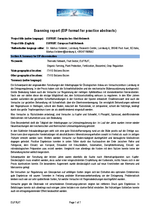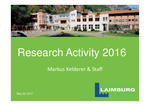Scanning Report Y2 on "Reduction in pesticide residues"
A focus of the applied research conducted by the working group for organic farming at Laimburg Research Centre is the crop regulation. In this context, lime sulphur application and the mechanical flower thinning asserted themselves over other methods that have been tested. In addition, the working group conducted experiments with neem extracts for the regulation of the rosy apple aphid, which represent the only possibility to control the pest effectively.In the 90s, systematic treatments against scab during the germ-phase of the spores have been developed. Noteworthy is the scab treatment with lime sulphur through the overhead irrigation: this technique preserves the soil, reduces residues, saves time, and spares beneficial organisms. Additionally, it reduces driftage due to the large droplet spectrum.
Regarding residues, experiments with copper, sulphur, K-phosphite, spinosad, drift-reduction techniques with nets were conducted. Residues still continue to be an important research topic for the working group.
Importantly, the group tested new developments of the mechanic and thermal weed control.
The group works also on soil management and fertilization: With the cultivation conditions in South Tyrol, a good nitrogen supply during the blossom affects the yields positively. The good nitrogen supply can be achieved through commercial organic fertilizer with assessable mineralising characteristics in the autumn and early spring
Experiments with organic-suitable measurements against soil apple replant disease were conducted. In this context, the following cases reached positive results: the exchange of the soil of the planting row with the one of the alley, the application of compost, the sowing of cruciferous plants, solarisation, steam sterilization and microbiological compounds. However, if the costs of these techniques are looked at and compared to their effects, none of these treatments are convincing.
Another important focus is the search for alternatives to cupper. However, thus far no other compound, except for the limited introduction of carbonates, has been introduced. In this context, new diseases like alternaria and marssonina are central topics for the working group. So is the control of Gleosporium. Experiments led to the following results: if the time frame for harvesting was met, acidic clay achieved some good results, as did the hot water treatment before the storage. Problematic are late maturing varieties for which trials with rain covers are conducted.
Trials against the codling moth with different netting-systems led to positive results when medium pressure. However, areas with a heavy pressure of codling moth can still suffer an infestation a few years later. Additionally, the early closure of the nets led to yield regulating effects.
The problem of the woolly aphid has not been solved thus far. Currently, attention is given to the susceptibility of the varieties and rootstocks. In general, much importance is given to the variety-testing in organic conditions.
Lately, the promotion of the June fruit drop through the application of transpiration inhibitors is receiving more importance.
Currently, a project for the promotion of beneficial organisms against the codling moth and aphids with the sowing of flower strips is conducted. In the fields of this project, no insecticides are applied. For the producer, the results of these experiments have been quite disappointing thus far.
Documents

|
Scanning Report Y2 on "Reduction in pesticide residues" () |

|
Research Activity 2016 () Presentation Held during EUFRUIT Meeting 2017, presenting Scanning Report of Year 2. |
Details
- Activity type
- Publication of scanning report
- Activity work package
- Reduction in pesticide residues
- Activity number
- Laimburg - WP3 - A89
- Activity contact
- Dr. Markus Kelderer
Laimburg Research Centre
Laimburg 6 - Pfatten
I-39040 Post Auer (BZ), Italy
[email protected] - Activity partner
- Laimburg
- Activity country
- Italy
- Last edit
- 19-07-2019

The EUFRUIT thematic network has received funding from the
European Union's Horizon 2020 research and innovation programme
under grant agreement No 696337.
European Union's Horizon 2020 research and innovation programme
under grant agreement No 696337.